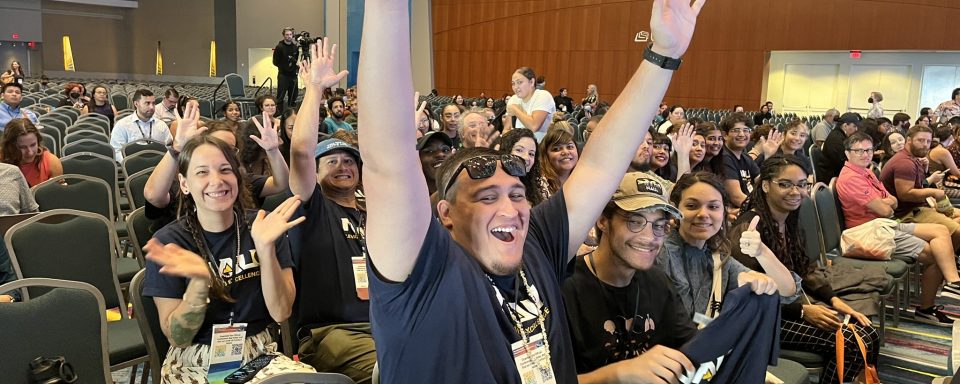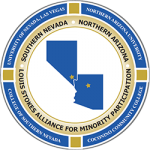Southern Nevada Northern Arizona Louis Stokes Alliance for Minority Participation (SNNA-LSAMP)
Supporting students from historically underrepresented backgrounds to increase diversity in Science, Technology, Engineering, and Mathematics (STEM)
The Southern Nevada Northern Arizona Louis Stokes Alliance for Minority Participation (SNNA-LSAMP) program provides several initiatives aimed at increasing the number of STEM baccalaureate and graduate degrees awarded to populations historically underrepresented in these disciplines, specifically: African Americans, Hispanic Americans, American Indians, Alaska Natives, Native Hawaiians, and Native Pacific Islanders. Through personalized outreach and individualized support, we strive to encourage enrollment in STEM degree programs, build community, promote academic achievement, increase STEM degree attainment, and prepare students for advanced degrees and STEM careers. If you would like to be involved in this supportive community, please fill out the LSAMP Interest Form.
-
STEM Exploration Tab Open
-
Undergraduate Research Tab Closed
-
Join us on Discord for resources and community Tab Closed
-
Post-Baccalaureate Transition Success Program (PBTSP) Tab Closed
-
Annual Professional Development Conference Tab Closed
STEM Exploration Accordion Open
Why pursue a STEM degree?
Getting a STEM (Science, Technology, Engineering, and Mathematics) degree can be highly beneficial for several reasons:
- High Demand and Job Security: STEM fields are known for their high demand and job security. Industries such as software development, engineering, data science, and healthcare consistently seek qualified professionals. A STEM degree can provide you with skills that are valued across various sectors and ensure stability in your career.
- Competitive Salary: STEM careers often offer competitive salaries and benefits compared to many other fields. This financial stability can provide you with greater opportunities for personal and professional growth, as well as the ability to support yourself and your family comfortably.
- Opportunities for Innovation: STEM disciplines are at the forefront of innovation and technological advancement. By pursuing a STEM degree, you can contribute to developing solutions to global challenges, improving quality of life, and making a positive impact on society.
- Flexibility and Versatility: STEM degrees provide you with a versatile skill set that can be applied in various industries and roles. Whether you’re interested in research, development, management, or entrepreneurship, a STEM background equips you with problem-solving abilities and analytical skills that are highly transferable.
- Career Advancement: With continuous advancements in technology and science, there are ample opportunities for career advancement in STEM fields. Whether through further education, certifications, or gaining specialized skills, a STEM degree opens doors to higher-level positions and leadership roles.
- Contribution to Societal Challenges: Many STEM professionals work on issues such as climate change, public health, renewable energy, and technological innovation. By pursuing a STEM degree, you can contribute to addressing these critical challenges and making a meaningful difference in the world.
- Personal Fulfillment: For many individuals, pursuing a STEM degree aligns with their passion for understanding how things work, solving complex problems, or making discoveries. The intellectual challenge and satisfaction that come from mastering STEM concepts can be personally fulfilling and rewarding.
If you want financial security, abundant career opportunities, and a chance to contribute to meaningful advancements in science and technology, consider earning a degree in one of the many STEM majors offered in the College of the Environment, Forestry, and Natural Sciences (CEFNS) or the College of Engineering (SCE). Academic advisors and LSAMP staff are eager to speak with you about degree requirements and how to be successful in these majors. We also host information sessions at the beginning of each semester and STEM exploration events throughout the year.
Next Steps:
Call or email the LSAMP office at 928-523-6740 or LSAMP@nau.edu. Let us know you’re interested in finding out more about STEM careers and majors.
Join the LSAMP Discord Community to learn about upcoming events and opportunities: https://bit.ly/LSAMP-DISCORD
Speak with your academic advisor to determine what courses you should take to get started on your STEM journey.

Undergraduate Research Accordion Closed
LSAMP-sponsored undergraduate research is a semester-long activity for selected students, supervised by STEM faculty members, to engage in a STEM-focused project outside of the classroom setting. The projects will have definitive start and end dates with appropriate benchmarks for completion of various components. Upon completion of their project, participants will be required to produce a technical poster to present at the annual SNNA-LSAMP conference. A performance-based stipend of $2000 will be provided to each participant who completes their research, produces a poster, and presents their findings.
Why engage in undergraduate research?
Participation in undergraduate research has a strong positive impact on persistence and degree completion. The hands-on application of classroom knowledge offers many advantages, including:
- Gaining clarification of your academic and career goals.
- Networking within your discipline, which may connect you to future opportunities.
- Developing professional skills and adding valuable experience to your resume.
- Strengthening transferable skills like written and oral communication, critical thinking, and problem-solving skills.
These benefits will contribute to a successful undergraduate experience and prepare you for your future career in STEM. Whether you plan to pursue a graduate degree or join the workforce, undergraduate research will set you apart from your peers and open many doors!
How to find a research project:
LSAMP faculty and staff, along with the Office of Undergraduate Research and Creative Activity (OURCA), are committed to assisting eligible participants in finding appropriate projects and research mentors. We have distinguished faculty researchers across all STEM disciplines who are eager to work with LSAMP students. You may already know of a project you want to work on, or just want to discuss options for the future. Either way, your next steps are to:
- Review the “How to get started” tab on OURCA’s website (see link above), and
- Fill out the LSAMP-funded research application.
These applications are reviewed on a weekly basis for research to be conducted in either the fall or spring semester each year. Due to our grant budget cycle, there is no funding for summer research. After reviewing your application, LSAMP staff will follow-up with you via email to guide you through the process.
Eligibility: To be selected for this activity, you must identify as an underrepresented minority (URM)* and also be:
- a U.S. citizen, U.S. national, or permanent resident of the U.S.,
- a sophomore, junior, or senior with a 3.0 minimum GPA,
- enrolled in an NSF supported STEM major**, and
- not already involved in research funded through another grant.
*For LSAMP program purposes, underrepresented minority (URM) students are individuals who are members of groups historically underrepresented in STEM at the undergraduate and graduate-education levels. In accordance with the solicitation (NSF 20-590) under which the SNNA-LSAMP grant (EES 2307200) is funded, these groups include African Americans, Hispanic Americans, American Indians, Alaska Natives, Native Hawaiians and Native Pacific Islanders. The purpose of LSAMP nationally and SNNA-LSAMP regionally is to broaden the participation of these students from these groups in STEM academic disciplines and careers.
** This includes most CEFNS and SCE majors, but does not include health professions or social sciences degree programs. See below for exact list of NSF approved NAU majors.
- Astronomy
- Biology
- Biomedical Science
- Chemistry
- Ecology and Evolutionary Biology
- Environmental and Sustainability Studies
- Environmental Sciences
- Forestry
- Geology
- Mathematics
- Microbiology
- Physics
- Civil Engineering
- Computer Engineering
- Computer Science
- Electrical Engineering
- Environmental Engineering
- Immersive Media and Games
- Informatics
- Mechanical Engineering
- Mechatronics and Robotics Engineering
- Multidisciplinary Engineering
- Software Engineering
Join us on Discord for resources and community Accordion Closed
Discord-based Resources
Discord is a voice, video, and text chat app that is used by our LSAMP community to network, share information such as upcoming events and unique opportunities, and provide resources like online tutoring and mentoring. Any NAU or CCC student is welcome to join; however, many of the posts are specific to our underrepresented minority (URM) STEM students. We encourage all URM students in CEFNS and SCE to join our LSAMP Discord server as it is the primary method we use to communicate opportunities and your participation will help build this supportive community.
Discord-based Tutoring
Each semester we will provide online tutoring in select STEM gateway courses with historically high D, F, W, I rates. All students enrolled in any section of these courses will be invited to use this service free of charge. The tutoring schedule will be made available to all instructors of these courses and will be posted on the LSAMP bulletin board outside of Biological Sciences room 132.

Post-Baccalaureate Transition Success Program (PBTSP) Accordion Closed
Preparing for graduate school admission can be overwhelming! The LSAMP-sponsored Post-Baccalaureate Transition Success Program (PBTSP) is an academic year-long activity (fall and spring semesters) consisting of graduate school preparation events and individualized assistance designed to help graduating seniors identify perspective STEM graduate programs, navigate the application process, and secure funding. Participants will complete various program components: establishing a timeline, exploring potential STEM graduate programs, creating a process to track application requirements and deadlines, drafting and finalizing their personal statement, securing letters of recommendation, and researching funding opportunities.
The PBTSP will culminate in the submission of at least two graduate program applications and one funding application. Graduate school application fees will be waived for NAU and UNLV STEM degree programs, and a performance-based stipend of $1000 will be provided to each participant who completes all PBTSP requirements.

Eligibility: To be selected for this activity, you must identify as an underrepresented minority (URM)* and also be:
- a U.S. citizen, U.S. national, or permanent resident of the U.S.,
- a full-time senior with a 3.0 cumulative GPA or higher,
- enrolled in an NSF supported STEM major**, and
- intending to enroll in a STEM-based graduate program no later than the fall semester immediately following your graduation.
There are a limited number of performance-based stipends, which will be awarded to eligible students on a first-come, first-served basis. Therefore, interested students should complete the PBTSP application as soon as possible and no later than the last day of September.
Why pursue an advanced STEM degree?
Are you thinking about pursuing a graduate-level degree in STEM? There are many reasons to do so, including:
- Personal growth – New experiences help you know yourself better and gain confidence in your abilities and future career.
- Skill development – Learn new equipment and techniques while mastering basic skills through hands-on practice.
- Professionalism – Join or become more involved in a professional organization to interact with fellow researchers and experts in your field.
- Career flexibility – Gain a competitive edge in the job market with an advanced degree.
- Increased compensation – Enjoy a higher starting salary and more opportunity for advancement.
Annual Professional Development Conference Accordion Closed
Annual Alliance Conference
Each spring semester the SNNA-LSAMP Alliance hosts a 1.5 day conference where students participating in Alliance activities can engage in professional development and networking activities as well as undergraduate research presentations and campus tours. The conference will be held in Las Vegas, NV during even years and Flagstaff, AZ during odd years. Conference registration will begin in January each year and priority will be given to students engaged in SNNA-LSAMP sponsored activities.

About LSAMP
Louis Stokes (1925 – 2015) was the first African American congressman elected in the state of Ohio, serving 15 terms in the U.S. House of Representatives. He was also the first African American to earn a seat on the powerful House Appropriations Committee, where he addressed many of the inequities faced by disadvantaged populations. The NSF grant funded program aimed at diversifying the nation’s STEM workforce was named in his honor.
We are part of the Southern Nevada Northern Arizona Alliance, which is a collaboration between University of Nevada, Las Vegas (UNLV), the College of Southern Nevada (CSN), Northern Arizona University (NAU) and Coconino Community College (CCC). The SNNA-LSAMP was formed in 2017 and funded under grant HRD1712523. The current program (2023-2028) is funded under EES2307200.

